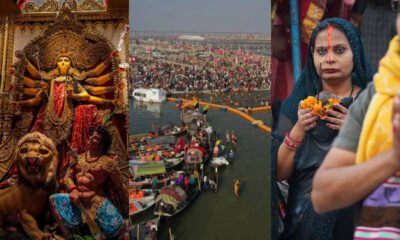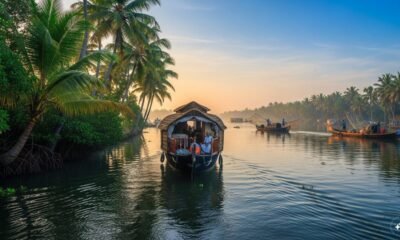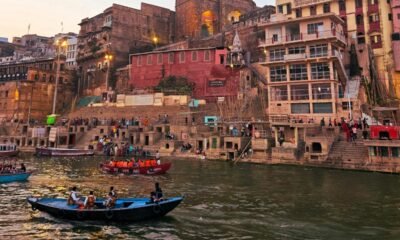Travel Guides & Articles
‘Made in India sourcing to touch 50% in next 5 years,’ says Adosh Sharma – Industry News

IKEA has opened its first store in the national capital, a 15,000 sq ft space in west Delhi’s Pacific Mall, as the Swedish home-furnishings giant accelerates its push into high-footfall urban locations. The move follows the company’s online launch in the Delhi-NCR region in March and is part of a wider omnichannel strategy combining e-commerce, large-format outlets, smaller city stores, and dedicated planning points. In a conversation with Sugandha Mukherjee, Adosh Sharma, country commercial manager, IKEA India, discusses store formats, omnichannel strategy, consumer trends, and why India’s homes, and habits are shaping the brand’s next phase of expansion. Edited excerpts:
How do you adapt IKEA’s Swedish identity for India?
While IKEA is Swedish, we also operate in over 80 countries in the world. Our model is very clear that while we bring a Swedish net with a lot of pride, we also consider what the local market is looking for. Our annual Life at Home report helps us see how Indians use their homes, so we can present global products in an Indian way. And we develop India-specific products, like pressure cookers and our Aromatisk decor line, so it’s “IKEA for India” and “India for IKEA”. Similarly, we still serve our iconic meatballs with lingonberry jam, but we’ve added local favourites like dal, paneer sabzi, parathas, biryani as well. It’s a mix that feels right for the market.
What role does India play as a production hub?
We have been sourcing out of India for the past 40 years, ever since IKEA retail began. There are a lot of exports that happen, especially textiles, metal, glass. Currently, roughly just under 30% of what we sell is sourced out of India. And our ambition is that in the next four to five years, we would like to increase it to 50% by working closely with our sourcing partners.
What consumer shifts are shaping your approach?
I think affordability and sustainability go hand in hand. Indians are generally people who are quite sustainable. Our products reflect that, water-saving taps, LED bulbs, jars with multiple lids so you buy less. Homes are also becoming lifestyle statements, not just functional spaces, and that’s where IKEA’s complete solutions fit well.
Looking ahead, what excites you most about Ikea India’s growth trajectory over the next 3-5 years?
It’s been a wonderful journey for us since we opened in 2018. We opened with one store in Hyderabad, and today we have five stores. And the beauty is that now we’ve got into a high gear on expansion with multiple store formats. Our distribution network is strong, and we’re pushing sustainability, like moving towards 100% electric vehicle deliveries. The pace of growth ahead is challenging yet supremely exciting.
IKEA is exploring smaller-format stores in north India. What needs do they meet compared with large stores?
We wanted to make IKEA just 30 minutes away for most people. City stores like Delhi’s Pacific Mall are metro-connected, easy to get to and see high daily traffic. They still have room sets, product displays, same-day carry-home items and the restaurant, just in a smaller footprint. The full range is online for fast delivery.
Do smaller stores affect sales?
Not really. Interestingly, people still spend 40–60 minutes here. While the large stores create a fun day out for the whole family, these smaller stores are more about frequent visits because they’re so accessible. Whether you buy online or in-store, it’s the same market for us, the key is reaching customers where they are.
How do e-commerce and stores work together?
The most amazing part of the brand and the concept is that the store still remains the epicenter for us. It still remains one of the biggest hooks for the customers to come in and understand what IKEA is all about. In Delhi, we went online first to understand the market, then opened the store. If you see something here that’s not in the store, you can order it online and get it in a day or two. We already have Gurugram and Noida that are under construction, and will have quite a wide network of stores around the city to cater to all strata of the population.
How does India differ from Europe in home living styles?
Indians tend to keep more things, so storage and organisation are big. Decor matters, TVs are still in living rooms, often as part of a display unit with travel souvenirs and art. Dining tables double as work desks. Kitchens aren’t just for cooking, they’re social spaces. It’s a different way of living, and we design with that in mind.
Travel Guides & Articles
Kalka-Shimla toy train halted for third day due to rain; tourism and taxi sector hit | Latest News India

The iconic Kalka-Shimla toy train services remained suspended for the third consecutive day on Wednesday due to multiple landslides and track blockages caused by incessant rainfall across Himachal Pradesh, severely impacting the tourism and taxi business in the hill capital.
Continuous heavy rains for nearly a week have disrupted normal life in the state, blocking roads and damaging infrastructure. The Northern Railway has announced that all services on the UNESCO World Heritage narrow-gauge route will remain suspended until September 5 as engineers work to clear debris and repair damaged sections of the track, particularly near Datiyar in the Solan district, where a portion of the track has reportedly been washed away.
The suspension has hit local tourism-related businesses hard, especially during the monsoon season when many visitors prefer the toy train for its scenic yet relatively safe travel experience.
Luckey, President of the Taxi Union at Shimla Railway Station, told ANI that the halt in services has left many drivers struggling to make ends meet.
“The rain has caused a lot of trouble. Roads are blocked almost everywhere. Our business has been badly affected. The train was our only link, bringing in some tourists, but it has been closed for five days now. We are finding it hard to even cover our daily expenses,” Luckey said.
He added that while the Railway has officially notified suspension until September 5, the damage is extensive.
“They say landslides have occurred in multiple places and near Datiyar, the track itself is gone. Even here at the station, we have to leave our vehicles and walk to avoid damage, because trees are falling everywhere. Our livelihood was running only because of the train, but since it stopped, everything has come to a standstill,” he lamented.
Authorities have deployed teams to clear landslides and restore connectivity on the track, but with more rain forecast, the timeline for resumption of services remains uncertain.
The Kalka-Shimla toy train, built in 1903, a heritage train route is one of the region’s biggest tourist draws, offering panoramic views of the mountains, valleys, and colonial-era architecture. Its prolonged suspension during peak monsoon season is expected to cause further economic strain on those dependent on tourism in the city.
Travel Guides & Articles
India’s TBO to acquire Classic Vacations

India based travel distribution platform TBO has agreed to acquire Classic Vacations from Phoenix-based investment firm, The Najafi Companies.
The transaction value is estimated at up to $125 million.
The acquisition brings together TBO’s technology platform and worldwide inventory with Classic Vacations network of luxury travel advisors and suppliers.
Classic Vacations delivered revenue of $111 million and an operating EBITDA of $11.2 million in the fiscal year ended December 31, 2024.
“We’re thrilled to bring Classic Vacations into the TBO family – the company’s longstanding delivery of outstanding services has earned the trust of its more than 10,000 travel advisors in the U.S,” said Gaurav Bhatnagar, TBO’s co-founder and joint managing director.
“Classic Vacations is led by a strong team of experts and will continue as an independent brand.”
“As we start working on integrating Classic Vacations with TBO, we will remain open to similar strategic alliances going forward,” added Ankush Nijhawan, co-founder and co-managing director.
Melissa Krueger, CEO of Classic Vacations, added: “Together, we’re strengthening Classic Vacations’ position as the premier luxury partner in the market while extending our reach onto the global stage.”
Classic Vacations was bought by The Najafi Companies in 2021 from Expedia Group.
Classic Vacations has a large network of high-value travel advisors and deep ties with major American consortia.
It delivers premium service across hotels, air, experiences, car rentals, and travel protection, specializing in bespoke luxury itineraries.
Related News Stories: Partner News – TravelMole
Travel Guides & Articles
Govt allows select minorities to stay in India without passport

The Union Home Ministry on Monday, September 1, issued an order announcing that the government now exempts minority communities, namely, Hindu, Sikh, Buddhist, Jain, Parsi and Christian fleeing religious persecution from Afghanistan, Bangladesh, and Pakistan, who entered the country by December 31, 2024, without requiring valid passports or travel documents.
“A person belonging to a minority community in Afghanistan, Bangladesh and Pakistan, namely, Hindu, Sikh, Buddhist, Jain, Parsi and Christian, who was compelled to seek shelter in India due to religious persecution or fear of religious persecution and entered into India on or before the 31st December, 2024,” read the order from the home ministry.
Interestingly, the order did not name Muslims. This is in line with the BJP-led government’s Citizenship Amendment Act (CAA) that was passed in 2019 to facilitate this. It had le to severe protests from Muslims and other citizens who said the law is discriminatory in nature and that it can also be misused to disenfranchise Muslims in the country.
In fact, over the last few months the central government and BJP-led state governments have been targeting Indian Muslims from West Bengal who were being picked up on false allegations of being Bangladeshi citizens. Several prominent activists including Umar Khalid and Sharjeel Imam are currently in jail having spent nearly five years in prison on charges of inciting riots in Delhi amid the anti-CAA protests.
It was issued as part of a series of directives made public by the Union Home Ministry, under the newly enacted Immigration and Foreigners Act, 2025, which came into effect on Monday, September 1.
The Immigration and Foreigners Bill, 2025, aims to grant the Union government the power to control the entry and exit of individuals into and from India by regulations that outline requirements for travel documents, such as passports, and govern various aspects of foreign nationals’ stay, including visa rules, registration procedures, and other related matters.
Previously, the Citizenship Amendment Act (CAA), which was enforced last year, extended the eligibility for citizenship only to non-Muslim minorities from Afghanistan, Bangladesh, and Pakistan who entered India on or before December 31, 2014.
While the recent directive allows certain individuals to stay in India without documentation if they arrived by December 31, 2024, it doesn’t guarantee citizenship.
In contrast, the 2019 Citizenship Amendment Act offers a path to citizenship for persecuted non-Muslim minorities from Pakistan, Afghanistan, and Bangladesh who entered India before December 2014.
The CAA’s exclusion of Muslims sparked widespread protests and concerns about discrimination, secularism, and potential disenfranchisement.
-

 Business5 days ago
Business5 days agoThe Guardian view on Trump and the Fed: independence is no substitute for accountability | Editorial
-
Tools & Platforms3 weeks ago
Building Trust in Military AI Starts with Opening the Black Box – War on the Rocks
-

 Ethics & Policy1 month ago
Ethics & Policy1 month agoSDAIA Supports Saudi Arabia’s Leadership in Shaping Global AI Ethics, Policy, and Research – وكالة الأنباء السعودية
-

 Events & Conferences4 months ago
Events & Conferences4 months agoJourney to 1000 models: Scaling Instagram’s recommendation system
-

 Jobs & Careers2 months ago
Jobs & Careers2 months agoMumbai-based Perplexity Alternative Has 60k+ Users Without Funding
-

 Education2 months ago
Education2 months agoVEX Robotics launches AI-powered classroom robotics system
-

 Funding & Business2 months ago
Funding & Business2 months agoKayak and Expedia race to build AI travel agents that turn social posts into itineraries
-

 Podcasts & Talks2 months ago
Podcasts & Talks2 months agoHappy 4th of July! 🎆 Made with Veo 3 in Gemini
-

 Podcasts & Talks2 months ago
Podcasts & Talks2 months agoOpenAI 🤝 @teamganassi
-

 Education2 months ago
Education2 months agoAERDF highlights the latest PreK-12 discoveries and inventions





















